Ten named winners of Distinguished Teaching Awards
Ten faculty have been named this year’s Distinguished Teaching Award winners.
Pablo Ancos, assistant professor of Spanish and Portuguese, Kiekhofer Award
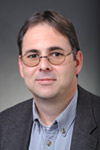
Ancos
Ancos is considered to be one of the bright, up-and-coming young scholars in his field. He came to UW–Madison in 1998 as a teaching assistant and became an assistant professor in 2005. He has taught a variety of courses, from undergraduate to graduate seminars in literature and culture.
“His teaching stands out from others by his continued exploration of nonconventional instruction and effective connection to students, particularly in the area of mentoring and involvement with full time learners,” writes department chair Ruben Medina.
Student evaluations reveal the enthusiasm that Ancos’ students show for his careful preparation and the effective techniques he uses to transmit the difficult literary material he has prepared.
Students emphasize his sense of humor and his talent for making his classes engaging. They say he is always willing to devote time to their questions and concerns and makes medieval Spanish literature come alive.
Ancos has served as faculty coordinator of the Residencia de Estudiantes, the Spanish language residence floor in the university’s International Learning Community (ILC).
“His performance at the ILC was outstanding,” writes Medina. “He developed close relations with every single student at the residence, which made his mentoring more effective and lasting. Students constantly sought him out.”
Ancos has been a key participant and facilitator of the Mesa de Conversacion, a two-hour informal weekly meeting that helps participants improve their oral skills in Spanish. It is open to all UW–Madison students and members of the community.
“Not only does he have a gift for making medieval Spanish literature accessible to many students, but he is also one of the kindest professors I have ever had,” writes Ph.D. candidate Katherine Oswald. “He has shown me the type of professor that I aspire to be. He puts his students at the top of his priorities.”
“I have had many teachers in my long life as a student,” writes Ancos. “Today I remember those with whom I learned the most, not because they used particular teaching methodologies or tools, be they innovative or traditional, but because they shared with their students the enjoyment of and dedication to their work.”
Jeffrey D. Hardin, professor of zoology, Chancellor’s Award
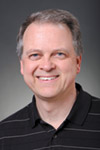
Hardin
Hardin, currently the chair of his department, epitomizes how faculty members at a major research university can enhance student learning through their passion, integration of scholarship in teaching and research, and local, national and international service.
In his 19-year academic career at UW–Madison, he has been a national and international leader in his field of research.
Hardin teaches a large upper-division course on embryonic development, Introduction to Animal Development. It had 24 students when Hardin took over in 1992. Enrollment grew quickly, and today it routinely attracts 175 students.
“Jeff motivates and captivates students using engaging examples, inspiring them to move beyond simple answers, to continue to ask questions and follow their curiosity to a deeper level,” writes colleague Seth Blair. “Given the importance of stem cells and cloning to current debates on the role of biomedicine in public policy, Jeff’s commitment to providing the scientific backdrop for current ethical debates has made his course a favorite among many of his students.”
Hardin developed an award-winning set of web-based materials for undergraduates that has received widespread recognition.
Another natural outgrowth of his teaching is his commitment to mentoring biology educators.
Hardin has served as faculty director of Biocore, a program with a long history of educational innovation and mentoring of faculty instructors on campus. He was in the inaugural class of Lilly Teaching Fellows at the university and a founding member of the UW Teaching Academy.
Hardin also served on several important committees involved in charting the future of biology at UW–Madison and chaired the initial steering committee responsible for guiding the first years of the Institute for Cross-College Biology Education (ICBE).
Hardin continues his commitment to biology education at the national level through his work on the editorial board of a leading international biology education journal, CBE-Life Sciences Education.
Two of his students write, “He often goes above and beyond his role as our professor, providing us with great advice, support and encouragement, be it for class, our personal development or our career direction.”
Pupa Gilbert, professor of physics, Chancellor’s Award
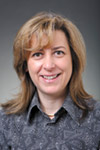
Gilbert
Students say Gilbert’s teaching is remarkable and puts physics in an entirely new light.
She has been an energizing force in her department since she came to UW–Madison 12 years ago, according to department chair A. Baha Balantekin.
“Building on her interest in the arts, she was instrumental in the evolution of a physics course for nonscientists titled Physics in the Arts. The course has proven so popular that it is always fully enrolled,” writes Balantekin.
With professor emeritus Willi Haeberli, Gilbert co-authored the textbook “Physics in the Arts.”
The undergraduate course has a typical enrollment of about 270 nonscience students from fields ranging from dance and the arts to political science and history.
With the support of a Chancellor’s Grant for Collaboration in Teaching, Gilbert created a new course, Microscopy in Life, a survey of state of the art microscopic, cellular and molecular imaging techniques. It features guest lecturers from around the university and laboratory tours of research facilities on campus.
As part of a cluster hire in biophotonics, Gilbert has developed extensive interdepartmental and cross-college connections, which were instrumental in the creation of a course that brings together numerous research fields. It is cross-listed in eight departments.
She is one of 12 physicists whose research and lives are portrayed in the book “Cool Careers in Physics,” published by Sally Ride Science as one of several “Cool Careers in Science” books for upper elementary students.
“She generates an impressive connection with students, in part by bringing her own personal experiences to the course,” writes Balantekin, “and students recognize that she truly cares.”
“She was enthusiastic, helpful and really accommodating to different learning styles, which made my experience in her class far more positive than my past physics experiences,” writes student Amelia Van Handel, who doesn’t like physics, but liked learning it from Gilbert.
Gilbert, who loves teaching, says her introductory courses are usually the last contact with physics that her students will have for the rest of their careers.
“If they remember it fondly, I have achieved my goal and done my service to better our society, which is sadly often skeptical of science and scientists.”
Mark Louden, professor of German, Chancellor’s Award

Louden
Louden quickly established himself as an outstanding teacher.
“His passion for teaching has radiated out into our curriculum in a number of ways — his own courses, his work on the undergraduate program, and his role as an adviser to undergraduate and graduate students,” writes department chair Sabine Gross. “He is a superb and devoted teacher at every level, and teaching our students is clearly at the core of his professional life. It extends from personal concern for each individual student’s trajectory to major curricular work to improve their educational program.”
Louden is credited with placing a premium on lively and intellectually stimulating classroom interaction and is continually engaged in improvement of instructional materials.
His national and international reputation as a linguist is based on his pioneering research in the area of Pennsylvania Dutch and German-related varieties in the U.S. and Europe. He also has scholarly strengths in Yiddish.
He is a fluent speaker of Pennsylvania Dutch and is the world’s leading authority on the language and the only scholar worldwide to offer it at the university level.
Gross writes that Louden’s students express their admiration, gratitude, enthusiasm and deep appreciation for someone they recognize as an exceptional teacher.
She says his courses provide students with better skills and give them a much more authentic and comprehensive sense of language in action in real life settings.
“He is a consummate teacher in the classroom, in his commitment to each student individually, and in the public sphere,” writes Gross. “He is a profoundly knowledgeable and energetic innovator on the curricular level, having devoted hundreds of hours to curricular redesign and course development, and he is an inspiring adviser to his students and advisees.”
“My commitment to the teaching mission of our university, in the spirit of the Wisconsin Idea, is a deep one,” writes Louden. “These past 10 years at the UW have by far been the most professionally satisfying for me, as I have had opportunities here I would not have anywhere else. I look forward to continuing to serve our students for many years to come.”
Melanie Manion, professor of political science and public affairs, Chancellor’s Award
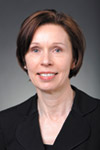
Manion
Manion came to UW–Madison in 2000 as an associate professor and teaches a range of courses at the undergraduate and graduate levels. Her teaching spans from large introductory lectures to small seminars.
Her areas include international public affairs, the politics of China, the political economy of corruption, introductory comparative politics and qualitative research methods.
Political science chair John Coleman and La Follette School of Public Affairs director Carolyn Heinrich say Manion has achieved an unusually high level of excellence with a dedication to teaching and innovative teaching methods.
“She demands a great deal from her students, but provides them with the support they need to succeed. She does not teach easy classes or allow passivity in the classroom,” write Coleman and Heinrich. “She is the type of teacher that students remember decades later as exemplifying all that is best about their university education.”
Among Manion’s innovative teaching techniques are the flipping of a coin at the start of every class to see if there will be a short quiz on the readings and providing a question-and-answer period at the end of her lectures, both of which engage her students in a meaningful way.
Manion is described as a thoughtful and caring mentor, and she is credited with playing a critical role in the establishment of new core components of the international studies program in the La Follette School.
“For me, teaching and research are not competing passions, but two sides of the same coin,” writes Manion.
“Indeed, the same passion and commitment to rigorous work she brings to her research is very evident in her teaching,” write Heinrich and Coleman. “She creates the opportunities and provides the tools for students to think critically, criticize rigorously, and create new knowledge.
In Manion’s Workshop in International Public Affairs, teams of students work with external clients to offer solutions to real policy problems.
“The class represents the Wisconsin Idea in action, where faculty and students are using their skills to make meaningful improvements in the world,” note Coleman and Heinrich. “Professor Manion’s lasting legacy is that she has challenged students to think critically and introduced students to a deeper understanding of one of the emerging world powers.”
Michael Jay McClure, assistant professor of art, Steiger Award
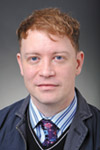
McClure
Since joining the art faculty in 2006, McClure has set himself apart as an instructor, according to nominator Tom Loeser, department chair.
“He consistently receives the highest evaluation scores of any faculty member in our department,” Loeser writes. “Professor McClure’s approach to teaching emphasizes intellectual rigor, clarity, responsibility and passion. He sets unapologetically high standards for his students. In other words, he does not ‘dumb down’ the material, but rather expects that students will rise to the expectations of the discipline. Students appreciate that he does not patronize them.”
McClure teaches a yearlong survey of modern and contemporary art, as well as special topics seminars. Even in his survey course, McClure grades students’ papers himself, rather than giving them to his teaching assistants, writes Loeser. “His exams test the students’ capacity to synthesize information: They need to combine what they have learned about the identification of artists and movements with the ideas that emerge in readings and lectures. His goal is to give students an experience of working professionally in this field, moving them beyond memorization to conceptualization.”
McClure’s research is in contemporary art theory, particularly theories of language and subjectivity, with expertise in European and American art. He recently completed a book, “The Rematerialized” Queer Objects in Contemporary American Art,” which is under review at three university presses. He also is working on a second book project. He has published several articles, lectured on campus and within the Madison community and served as a committee member for more than 40 graduate students. He developed a new curriculum for both semesters of the Art Survey course and has taught 10 different seminars for graduate students and advanced undergraduates.
“Professor McClure’s confidence is contagious, and my experience as his student also informed my teaching practice,” writes Chele Isaac, a former student and teaching assistant for McClure. “He inspires trust in a process of searching that is nonconforming.”
“Every time I teach, I am aware of a network of educators who inspired me with their passion, their commitment and their unforgiving standards,” writes McClure. I steam from their methods shamelessly and attempt to carry something of their wisdom, charm and panache into the classroom.”
Galen A. McKinley, assistant professor of atmospheric and oceanic sciences, Class of 1955 Award
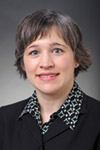
McKinley
Nominator Jonathan Martin describes McKinley as “an innovator.” “Not long after arriving here, she secured a grant that provided a rotating tank apparatus that has been a powerful, hands-on addition to her lectures on aspects of fluid flows,” Martin writes. “We now offer a course on use of the tank, in which senior undergraduate and graduate students are challenged to come up with illustrative experiments that exploit the power of live demonstration to elucidate complicated fluid dynamical concepts.”
McKinley shows her innovative spirit in her lab work, including field trips to Lake Mendota for her Physical Oceanography course, where she provides students with hands-on opportunities to make and interpret observations. She has students in another course run their own experiments and developed a Carbon Cycle website, in which users define the future trajectories of carbon sources and sinks and see the impact of atmospheric carbon dioxide concentration.
McKinley also has been an undergraduate research mentor within the department, with two publications with undergraduates in which the undergraduate collaborator is the first author.
McKinley also has participated in the Wisconsin Idea seminar and conducts workshops for K-12 teachers on climate science and climate change.
“We believe that Galen’s scholarly contributions to the areas of ocean and Great Lakes biogeochemistry and carbon cycling are indeed exceptional,” writes Martin. “It is clear upon considering her equally compelling research prowess that the energy she brings to teaching and mentoring is powered by and an extension of her national and international renown as a creator and articulator of knowledge of the natural world.”
“Professor McKinley’s teaching style provides her students multiple avenues in which to learn and reinforce material through a variety of hands-on applications,” writes Andrew Winters, a senior in the department. “Instead of simply presenting information, Professor McKinley allows students to grasp and take ownership of their own education.”
Bassam Shakhashiri, professor of chemistry, Van Hise Outreach Award
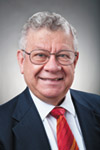
Shakhashiri
“Scientist by training, teacher and public servant by trade, advocate by conviction, optimist by nature.” This is how Shakhashiri describes himself, adding that he is also an “entertainer by avocation.”
Possibly best known for his annual program “Once Upon a Christmas Cheery in the Lab of Shakhashiri,” the longtime UW–Madison professor has set out to prove that “science is fun!” — so much so that he has chosen the phrase as his website name. “By demonstrating how much fun it can be, Dr. Shakhashiri, in his role as advocate for science, seeks to impart the joy of discovery that has engaged young minds throughout history,” according to his award nomination papers.
Shakhashiri is not like most of his colleagues, writes nominator James Weisshaar, chair of the Department of Chemistry. “Rather than pursuing chemical research per se, he has forged a remarkable career based on chemical education, outreach and public service. When I travel, everyone seems to know Bassam,” writes Weisshaar. “He is easily the most visible chemistry faculty member, and I would wager he is among a handful of the most visible UW–Madison faculty members as well.”
In addition to his holiday program, Shakhashiri’s program “The Science of Fireworks” was featured at the Memorial Union Terrace before the Rhythm and Booms show in July and at the Concert on the Park with the Madison Youth Orchestra. Last summer, he conducted weeklong workshops for students in the College for Kids program and for students in the Pre-College Enrichment Opportunity Program for Learning Excellence (PEOPLE). And he started a new program under the Wisconsin Initiative for Science Literacy aimed at encouraging chemistry Ph.D. candidates to include a chapter in their theses explaining their research to nontechnical audiences. In November, Shakhashiri was named president-elect of the American Chemical Society, the largest scientific organization in the world.
“In a time when science is increasingly important, our nation knows far too little about how science works and what it can and cannot do,” writes Weisshaar. “Bassam’s outreach efforts constitute a major force toward a new scientific enlightenment.”
Freida High W. Tesfagiorgis, Evjue-Bascom Professor of African and African American Art History and Visual Culture, Chancellor’s Award
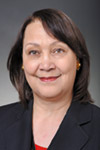
Tesfagiorgis
A UW–Madison professor for 38 years, Tesfagiorgis saw the creation of the Department of Afro-American Studies, writes Brenda Gayle Plummer, professor of history.
“As a visual artist and scholar, Professor Tesfagiorgis brings a unique perspective to research and scholarship about art,” writes nominator Sandra Adell. “She teaches her students how to see art objects in terms of technique, style and form and to write art critique that is both theoretical and practical. As an artist, she offers deep and interesting insights into how the artist achieves what he or she set out to accomplish; as a scholar she introduces her students to critical theory that takes into account the intersections between gender, race and class and the historical contexts that undoubtedly have an impact on why certain artists work the way they do.”
Tesfagiorgis has worked to establish interdisciplinary ties with the Department of Gender and Women’s Studies and was a founding member of the Visual Culture Studies program. “Her classes reflect her experiences as a practicing artist and scholar with expertise in art history and critical race theory,” writes Adell. “As student comments suggest, students leave her class much more enriched than when they started.”
Tesfagiorgis organizes art museum visits to complement her belief in “site-specific teaching,” which she says is integral to learning about art. She gives students practical experience in the design of museum and gallery space and encourages them to think about how the placement of art objects in gallery and public spaces have implications that most of us won’t think to consider.”
Tesfagiorgis conducted a weeklong lecture-seminar-workshop forum on art education in museums and museum-schools in Nigeria in 2009, her mentorship extending beyond the classroom. She contributes to curriculum development, helping design the curriculum for the new master’s degree program in gender and women’s studies and to develop the department’s introductory seminar.
Writes Tesfagiorgis, “Above all, I aim to stimulate students to learn, question, formulate problems, discuss, critique, resolve some aspect of the questions raised and to discover themselves within the body of knowledge and objects that they encounter.”
Giri Venkataramanan, professor of electrical and computer engineering, Chancellor’s Award
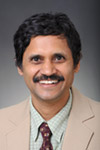
Venkataramanan
Known in his department as an “unusually effective, innovative and inspiring teacher,” Venkataramanan’s teaching is based on a strict interpretation of constructivism and authenticity in education, writes nominator John Booske, professor and chair of the Department of Electrical and Computer Engineering.
“Giri strives to bring concepts to action in courses, motivated by pressing societal concerns on sustainability,” he writes. “His reputation as an outstanding teacher is so well known in my department that many students who are not interested in power electronics are attracted to the course. At the end of the semester, many of these students leave with an increased desire to know more about the role of power electronics in addressing the global challenges of energy and sustainability.”
Venkataramanan also is involved outside the classroom, specifically as faculty director of the Engineers Without Borders chapter on campus. Students visit and participate in community projects in developing nations, such as providing hydroelectric power to a community in Haiti — a project that won the prestigious United Nations engineering award in 2009. Other projects have been completed in El Salvador, Rwanda, Kenya and Red Cliff, Wis., and in August, students designed a biofiltration garden to clean the Vilas Beach area in Madison.
“His exceptional performance is a product of his design-oriented teaching, paired with his genuine desire that each student fully grasp the material,” writes student Marcus Weber. “I find his ambition, attention to detail and educational philosophies to be atypical and extremely advantageous to the education of future engineers.”
“I believe that my continuing evolution as an educator has been steadily shaped by a careful study of assessment of student-learning outcomes in my courses,” writes Venkataramanan. “I strive to bring to action the Wisconsin Experience — the idea that, together, we create and apply learning inside and outside the classroom to make the world a better place.”




